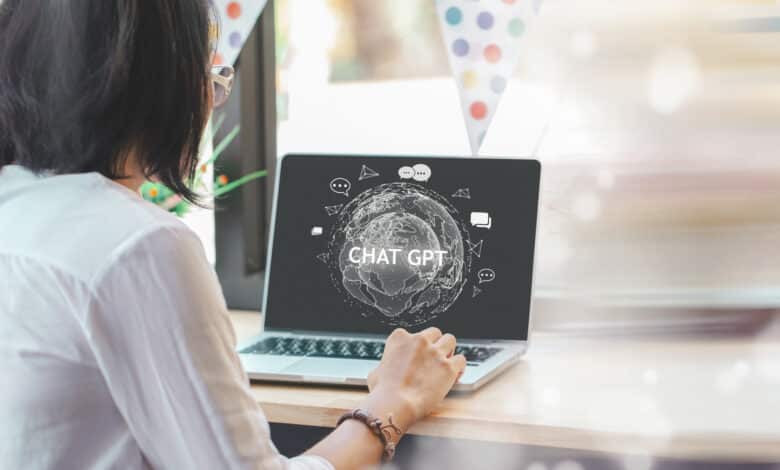
Chatbots like ChatGPT are currently causing many publishers sleepless nights. While they worry about their future revenues, politicians are urging them to keep a cool head for the time being.
Publishers increasingly demand license fees from ChatGPT
ChatGPT is currently the talk of the town. The AI-powered tool enables automated text authoring of unprecedented quality. As a result, even experts are often unable to distinguish between a work written by ChatGPT and a human. But behind ChatGPT’s texts is no independent performance of the chatbot. Instead, the tool is based on a gigantic database that is constantly growing. This allows the program to create its own texts based on the information freely available on the Internet. However, these are based on texts that authors have written and websites have published. This makes publishers all the more annoyed at the current lack of action on the part of politicians. Since ChatGPT uses foreign works, they demanded some days ago from the German policy an action. In particular over license fees one would have to speak thereby from view of the press houses.
Even if a spokeswoman of the Federal Ministry of Justice states to the colleagues of Golem.de that the already valid legal situation provides for sufficient mechanisms of defensible legal action, international examples worry then nevertheless. In the meantime, for example, it has become known that it is possible to view even paid content from the press. With the help of the chatbot in Microsoft’s Bing search engine, users in the U.S. succeeded in having the content of articles displayed that were actually behind a paywall. The well-known newspaper “The New York Times” was affected. If this problem worsens, it will no longer be just the journalists’ copyrights that are affected. On top of that, there is the threat of a loss of paying subscribers. Accordingly, the demands for license fees are now becoming louder and louder internationally. Finally, ChatGPT has answered the question of guilt in this matter as honestly as only an artificial intelligence can.
Francesco Marconi, himself a PC technology journalist, asked the tool what sources it drew from. The answer revealed that traditional press houses such as BBC News, the Washington Post and the Guardian, but also modern papers such as Wired and Tech Crunch serve as sources. And those are just the best-known representatives. OpenAI is likely to use just about any halfway reputable news source to train its ChatGPT. Accordingly, publishers should already be able to charge money for this training. At least that’s the view of Jason Conti, general counsel at News Corp (parent company behind the Wall Street Journal, among others). This says to the news portal Bloomberg that there are so far no comparable agreements.
Texts from ChatGPT do not violate copyright
As a rule, an infringement of German copyright law only exists if the author of a work can be identified beyond doubt in a new work. Thus, a certain distance from the original work must always be maintained. Since ChatGPT uses countless sources for its texts, the result is a mixture of so many authors that no origin is recognizable. A violation of the copyright law will be found in the rarest cases. The situation is different, however, when it comes to so-called text and data mining. Here it is a matter of OpenAI using the texts of publishers to learn its chatbot. Only in this way is it possible for the chatbot to find a corresponding text in its own database. Accordingly, there are some open questions in this area that definitely need to be clarified.
The FDP, however, sees immense opportunities in ChatGPT and warns against putting the chatbot in shackles prematurely. Maximilian Funke-Kaiser, spokesman for the FDP’s parliamentary group in the Bundestag, tells Golem.de that ChatGPT could make the work of many companies easier. When asked, he even warns against accommodating the publishers too much and adapting the ancillary copyright. After all, in his view, this could result in “the system no longer being able to access or process certain online content.” The legal policy spokesperson for the FDP, Katrin Helling-Plahr agrees with her party colleague. She emphasizes that one does not want to “stand in the way” of the possibilities of ChatGPT. For this, in her view, “legal positions […] should be rethought in the digital age.”
Unanimity in the Bundestag
But the FDP parliamentary group is by no means alone in its view. Rather, it seems to be the unanimous opinion in the Bundestag that ChatGPT should not be demonized prematurely and that legal adjustments or entire new regulations are inappropriate for the time being. It is rather important that existing regulations are implemented vehemently. Existing EU law already contains extensive provisions on text and data mining. In general, there seems to be agreement among politicians that they do not want to put any obstacles in the way of new technologies without putting authors at a financial disadvantage.
In order to reconcile both interests, one would first like to wait and see whether the “press destruction” currently predicted by many through ChatGPT will actually be initiated. Should this be the case, a renewed debate about alternative revenue models for publishers is likely to be unavoidable. In summary, then, there is a bipartisan fear that overly strict legal requirements for chatbots could put German companies at a competitive disadvantage.
ChatGPT is just the beginning
For many experts, ChatGPT from OpenAI is considered a blueprint for the future. After all, after this tool, many others will be launched that will offer similar services. Particular attention is being paid to Google’s plans in this regard. The search engine giant is currently also working hard on its own chatbot. However, it will not primarily be copyright issues that concern politicians. Rather, there are already fears that Google could pose a major problem from a competition law perspective. After all, the tech company itself offers various services that could then find their way unnoticed into the results of Google Bard. Just imagine that you ask Google’s chatbot for the best local hairdresser and “Bard” then answers with the company that has paid the most money to the search engine and advertising giant.
So far, however, this is still pie in the sky. We are curious to see how long politics can continue to allow ChatGPT to operate without limits. What is certain is that the publishers must be accommodated, at least to the extent that no more unlimited text and data mining may take place. Here, the author’s consent is simply mandatory. Possibly OpenAI and the publishers can come to an agreement in this regard. At the latest when other chatbots enter the field, the underlying data will once again become more important. After all, competition is known to stimulate business. Publishers may even profit from the new technical achievement, as their texts and data will be bought off with a kiss in exchange for an attractive license fee. If only one had a crystal ball at hand…




No replies yet
Neue Antworten laden...
Gehört zum Inventar
Beteilige dich an der Diskussion in der Basic Tutorials Community →